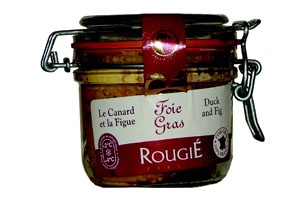 The foie gras industry started to develop around 1820 and has been one of the farmer’s main profit sources ever since. The gosling sand ducklings are bred in the open air and are fed with lucerne to develop their digestive systems but are then moved to a small enclosure and well fed with flour and corn three times a day for 3–4 weeks, thus ensuring that the weight of the bird’s liver is 770–900 g for geese and 400–500 g for ducks. The notion prevails that the birds do not suffer.
The foie gras industry started to develop around 1820 and has been one of the farmer’s main profit sources ever since. The gosling sand ducklings are bred in the open air and are fed with lucerne to develop their digestive systems but are then moved to a small enclosure and well fed with flour and corn three times a day for 3–4 weeks, thus ensuring that the weight of the bird’s liver is 770–900 g for geese and 400–500 g for ducks. The notion prevails that the birds do not suffer.
Luxury store Fortnum & Mason (F&M) have announced that they will no longer sell duck foie gras. This is illustrated by an email that F&M’s managing director sent to PETA (People for the Ethical Treatment of Animals): “Thank you for your email regarding the sale of foie gras by Fortnum & Mason. As part of our normal review process for provenance and product quality we have visited our supply base and made a number of changes. Firstly, we have decided to cease the sale of duck foie gras, from intensively reared birds. We have also reviewed our supply base for goose foie gras and now have only two specific French suppliers, whom we have worked with to ensure that the production standards are of the highest levels. We have no plans to further review our foie gras offering.”
Even Prince Charles has instructed all his chefs to remove foie gras from menus at Royal residencies. One of his favourite shops in Gloucestershire may also see the removal of The Prince’s “Royal Warrant”, as they also sell the enlarged livers of ducks and geese. According to a source at Clarence House (one of the Royal residencies), “The Prince of Wales has a policy that his chefs should not buy foie gras”.
 If it was determined that gavage was unacceptably painful for the animals, would it be OK to ban the sale of foie gras produced using the technique of gavage? Or should the ban only apply to the practice of the process within the state or locality? The answer of course depends on what one’s intentions are in supporting a ban. The first proposal would limit the consumption of gavage-produced foie gras, while the second would limit its production, but not necessarily its consumption. Considering the foreseeable effects of banning the sale of gavage-produced foie gras, it seems that an outright ban on gavage-produced foie gras would be more effective.
If it was determined that gavage was unacceptably painful for the animals, would it be OK to ban the sale of foie gras produced using the technique of gavage? Or should the ban only apply to the practice of the process within the state or locality? The answer of course depends on what one’s intentions are in supporting a ban. The first proposal would limit the consumption of gavage-produced foie gras, while the second would limit its production, but not necessarily its consumption. Considering the foreseeable effects of banning the sale of gavage-produced foie gras, it seems that an outright ban on gavage-produced foie gras would be more effective.
Leave a Comment
You must be logged in to post a comment.






